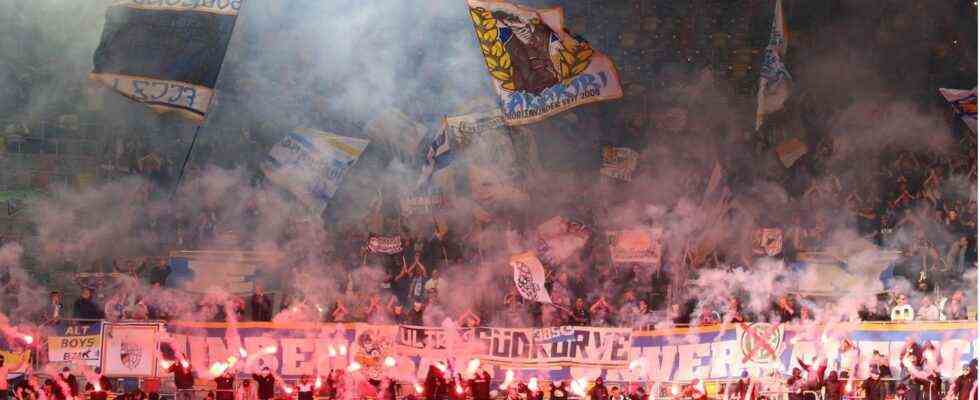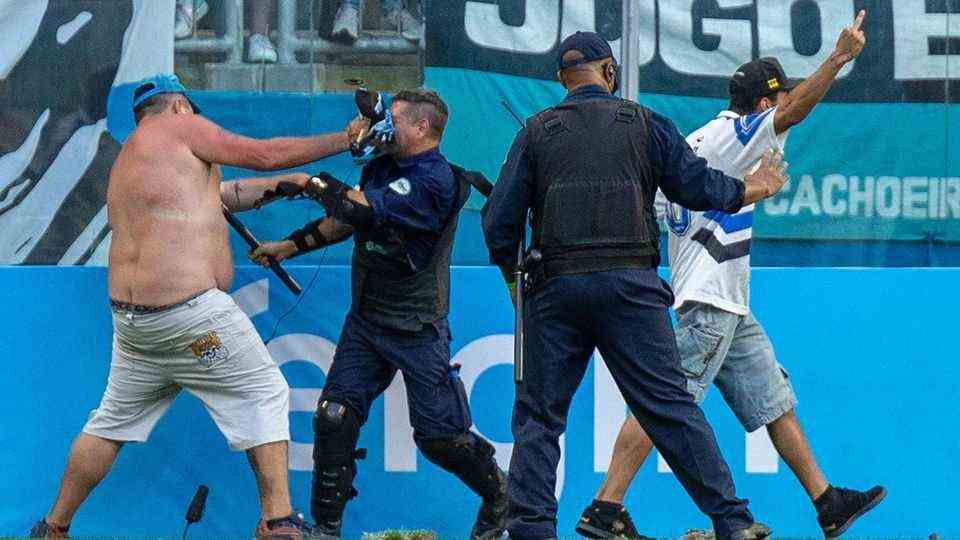Before BGH judgment
“Punished for something that we cannot influence”: Do clubs have to be liable for their fans’ pyrotechnics?
Pyrotechnics in the fan block: The proceedings before the BGH were initiated by FC Carl Zeiss Jena
© Revierfoto / Picture Alliance
The following applies to pyrotechnics in stadiums: clubs are liable for their supporters. This could change now. The Federal Court of Justice should decide whether the DFB may even impose the sometimes harsh penalties. The verdict could rekindle a year-long dispute.
Who is to be held responsible if prohibited pyrotechnics or firecrackers are ignited in the stands in football stadiums? So far, the clubs have to atone and pay for it. But is the DFB even allowed to impose these fines? The Federal Court of Justice (BGH) in Karlsruhe will give a verdict on this fundamental question on Thursday (8:30 a.m.). Fan representatives and experts take a closer look: The decision could rekindle the dispute over the collective punishment that has been going on for many years.
Carl Zeiss Jena initiated the process
One speaks of a collective penalty when a sports court condemns a club after fan riots, for example, to play games in front of empty spectator blocks or even in an empty stadium. Then even peaceful supporters have to face the consequences of wrongdoing by others. The topic has been a political issue for many years in the disputes between the organized fan scene and the German Football Association.
The proceedings before the BGH were initiated by FC Carl Zeiss Jena. The Thuringian should pay a total of almost 25,000 euros for disruptions to two third division home games and one away game in 2018. Managing director Chris Förster does not want to accept that. “We are taking all measures that are necessary,” he said after the BGH hearing on July 1st. “We are being punished for something we cannot influence.”
The case raises a “wealth of problems”, said the presiding judge Thomas Koch at the time. The legal and procedural rules of the DFB stipulate that the clubs are responsible for the behavior of their supporters and spectators. You are responsible for “incidents of any kind in the stadium area before, during and after the game”.
This means that you will be asked to pay for any disruptions. Depending on the severity of the incident and the financial strength of the association, it can go up to six-figure sums, the money goes to foundations. According to an earlier BGH ruling, the clubs can get the money back from the rioters and claim damages. However, these must first be found.
Who Owns Football? These are the richest club owners in the world
12 images
Crucial: Are the payments considered a penalty or a prevention?
Jena was unsuccessful before the competent arbitration tribunal. The highest civil judges of the BGH are now examining whether this arbitration award can stand. The Frankfurt Higher Regional Court had confirmed him in the lower court.
The BGH can only overturn an arbitration award if it violates elementary principles of the legal system, as Senate Chairman Koch already explained. “So that’s a very high hurdle.”
But: One such principle is the principle of guilt. It says that every conviction and every punishment presupposes a fault. Koch said that an important decision will be made here as to whether the payments are to be viewed legally as a penalty or as a preventive measure. On the other hand, there is the association’s autonomy, which could justify restrictions on the principle of guilt under certain circumstances.
A central point of criticism for the judges seemed to be that home and visiting clubs are equally liable. Unlike the hosts, who also benefit economically, the visiting club has no influence on the stadium operations, said Koch.
Collective punishments are met with heavy criticism from fans
The penalties regularly imposed by the DFB sports court have met with protests from fans for many years. “With regard to the fan scene, we are talking about a large number of young people, and most of them have a pronounced sense of justice,” said Michael Gabriel, head of the Fan Projects Coordination Office (KOS) in Frankfurt / Main. “This is regularly challenged by the specific penalty system in football, for example when large groups of fans are punished for the misconduct of individuals, the so-called collective penalties.”
The same applies to the no-fault punishment as in the present case: “Here, one’s own reference association is to be punished for something for which it can be proven that it is not responsible.” From the point of view of KOS and the fan projects, a procedure after fan offenses should be “strictly perpetrator-oriented” – with priority on state criminal prosecution.
DFB lawyer Thomas Summerer, however, said after the trial in July: “We still consider the clubs’ liability for spectator riots to be indispensable.” The association hopes that the Senate also has the safety of the audience in mind when making its decision. “The no-fault liability of clubs for the misconduct of spectators attributable to them has been recognized for years by the International Sports Court Cas as well as the Federal Court of Justice,” said DFB interim president Rainer Koch. The previous decisions in the Jena case are “in full accordance with this legal situation that has been clarified for years”.


